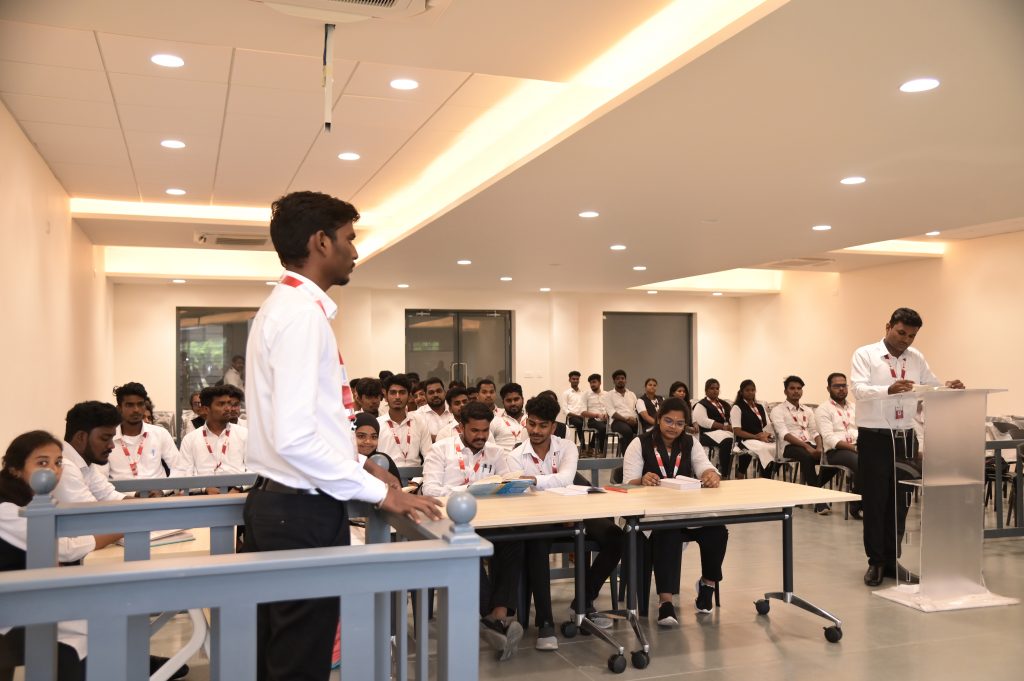Gone are the days when we believed law was far from practical learning. In this new era of law that kicked in with the globalised world, law, technology, and practical experiential learning have come to terms. The long-observed gap between theory and practise of law is narrowing since subjects taught in law schools are now directly linked to practise areas, and students are exposed to practical training through moot courts and internships. The old saying that the law as taught is far from what happens in court has become nearly redundant.
With new law schools and advanced methods of teaching, law has become a tool for the all-round development of individuals. One such thing that created the much-needed excitement in a philosophy and theory-heavy field of law is moot courts. Moot Court is essentially the laboratory of any law school, where students learn key skills required by a lawyer in the simulation of a courtroom.
This step of engaging students to learn by experiencing legal practise in a simulated courtroom environment is essential for law students. The theories of law in the books and how to apply them in court practise definitely require linking. This link is created through moot court competitions by engaging young legal minds in great legal research. The best law schools across the globe have dedicated moot court halls with amazing wood-raised court setups where you can see (generally two) witness boxes, dais, bars, and benches.
Different universities, organisations, and law firms collaborate to organise prestigious moot court competitions. The mooting culture across the globe is well established, and law students from various law schools participate in moot courts to learn and experience the practise of law.
In any moot court competition, students are given a set of facts (a hypothetical case) detailing the scope of the problems, which they have to deal with while acting as lawyers on each side. Students are then expected to determine the range of legal issues pertaining to these facts. They are expected to do research on the different aspects of the law touched upon by these facts. They then examine the various arguments that are to be brought before the court from both sides. These arguments are then arranged in a logical frame and presented before the court. The arguments are drafted in the form of a memorial by each side. The oral rounds of moot courts require a team of three students on each side: two speakers and one researcher. These teams present their arguments before the mock court and pray for a resolution.

Students need to develop a range of skills to excel in moot courts. Following are the key skills required at different stages of moot court preparation:
Firstly, starting from observation skills, focused reading, analysis, and application of the law while reading the moot problem
Secondly, while developing arguments, skills like legal research, organising arguments, and communication strategy are important to develop.
Thirdly, while drafting the moot memorial and case compendium, excellent drafting skills, creativity, and precision of wording are the key skills required.
Fourthly, during the oral rounds, skills like public speaking, teamwork, and team synchronisation need to be honed.
In addition to the above-mentioned skills, moot court competitions are a great tool for networking and meeting stalwarts from different fields of legal practise. Moot court competitions like Philip C. Jessup and Vis Moot are a gateway to meet young and passionate legal brains and learn from the best practitioners from across the globe. Many such prestigious moot court competitions are organised across the country and overseas.
Law schools have clubs or societies that organise moot court competitions and train young lawyers to moot in different competitions. These bodies are also responsible for ranking teams as per the intramoot court competitions at a university and sending the selected teams to national and international moot court competitions. These teams represent their law schools in the competitions.
Some popular myths about moot court competitions include the following: (Mentees and students ask me every now and then.)
First myth: Moot courts are only for those who want to do litigation. This is not true, as, firstly, a blanket mandate for mooting has been created by the Bar Council of India for the completion of graduation in law. Secondly, mooting is a multiple-skill development exercise that focuses on the overall personality development of an individual.
Second myth: Moot courts are only for students with good oratory skills. This is a widely believed myth; however, it is equally untrue, as a good mooter is much more than just an orator. Such a person is an amalgamation of a combination of skills, and oration is just one of them. In fact, the role of the researcher in a moot court is of utmost importance, as his work determines the team’s performance during legal argumentation.
Third myth: The researcher’s role ends after the preparation of the moot memorial. This is another myth that new mooters tend to believe. This is untrue, as the role of a skilled researcher in the moot court reaches far and wide. A researcher not only helps in elaborating the arguments with legal research but also during the oral rounds. The agility of a researcher helps the speakers answer the questions raised by judges better. They are like a cushion and support system for the team.
Fourth myth: Speakers have to learn the speech before entering the courtroom. This myth has taken down the best orators in a moot court. It is important for students in their freshman year to understand that there is unpredictability in a moot court room after you enter, so much so that you cannot guess the questions that the judges will ask. This is why, apart from preparing the speech, students must imbibe the facts, understand the legal issues arising out of them, and organise their arguments logically while speaking. Additionally, they have to be prepared to answer any question related to or remotely related to the field of law and the ethics of legal practise.
Fifth myth: Court mannerisms are ‘being timid’ in a courtroom. This is a myth that destroys the charm of many great speakers. There are compendiums, documents, books, and videos all over the internet that introduce the various courtroom manners to students. In a race to learn by heart these ‘keywords’, students tend to fall into the pit of mechanical mannerism, which upsets the judges more. It is important that law students learn these manners as a part of their professional ethics and act exactly as respectfully as one would if they were standing before the highest court of the country.
Moot courts are a pathway to learning, and law students must engage in this co-curricular activity as actively as possible. It helps in building their CVs and endorsing their understanding of legal issues and various other skills while practising law as lawyers.
Happy Mooting!







